Key takeaways:
- Family game nights strengthen family bonds, teach teamwork, and encourage communication through shared experiences.
- Games can be a powerful tool for educating children about financial literacy and concepts such as investment, saving, and risk management.
- Incorporating themes of cryptocurrency into family games allows children to grasp complex financial concepts in an engaging manner.
- Playful interactions during game nights create lasting memories and promote deeper conversations about important life lessons.
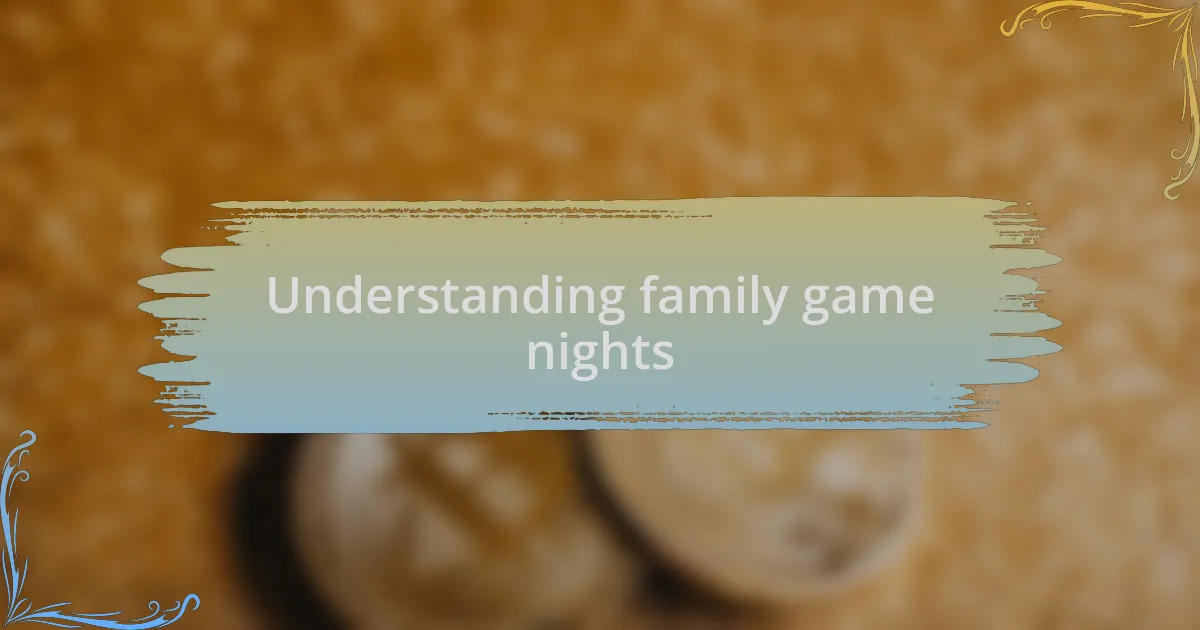
Understanding family game nights
Family game nights are more than just a fun way to spend an evening; they are a unique opportunity to foster connection and communication among family members. I still remember the laughter that filled our living room as my sister and I teamed up against our parents in a game of Scrabble. Those moments not only strengthened our bonds but also taught us the value of teamwork and healthy competition.
I often think about the diverse range of games we played and how each one held its own lessons. For instance, strategic board games helped me develop critical thinking skills while party games showcased the importance of creativity and spontaneity. Have you ever noticed how a simple game can reveal hidden talents in your family? I discovered my knack for strategy during a heated game of chess with my dad, which sparked a passion that I never knew I had.
Moreover, family game nights create a relaxed environment where every voice can be heard. I vividly recall times when a simple question about the game turned into heart-to-heart conversations, allowing us to share our thoughts and feelings. Isn’t it fascinating how a card game can segue into discussions about our dreams and challenges? These experiences turn casual nights into unforgettable learning opportunities, shaping our family dynamics in meaningful ways.
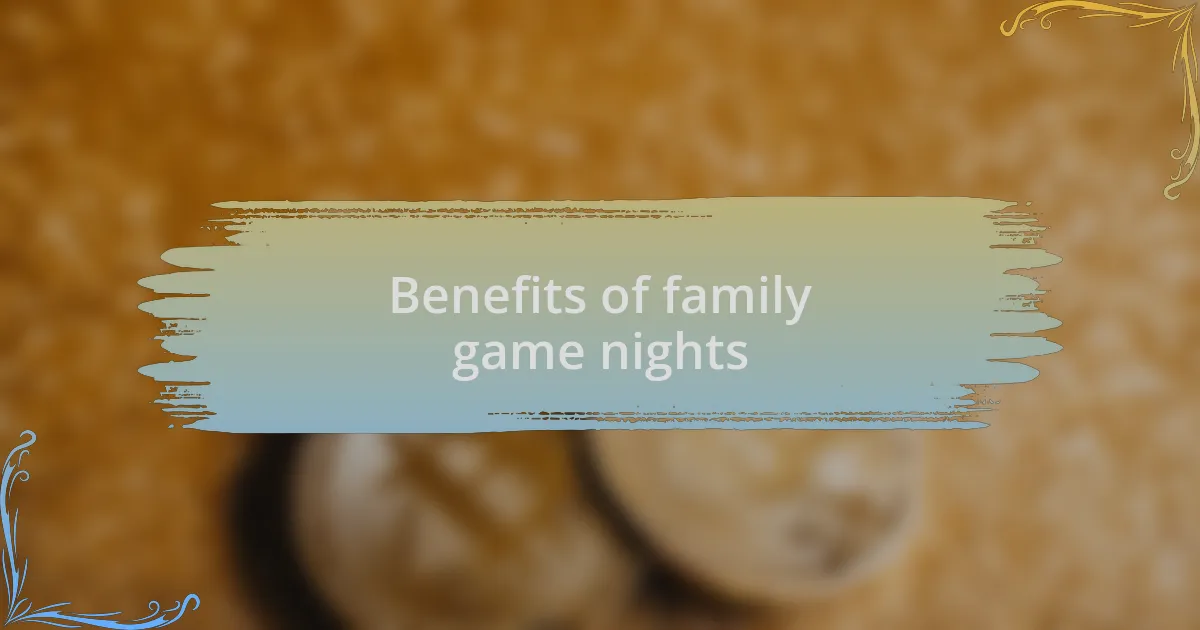
Benefits of family game nights
Engaging in regular family game nights brings a wealth of benefits that go beyond just amusement. I remember one particular evening when we played a trivia game that sparked debates and laughter over random facts. It was amazing how these discussions not only entertained us but also nurtured our knowledge and curiosity. Who would have thought that a simple game could turn into a trivia-filled family lecture, weaving in amusing stories and lessons learned over the years?
These evenings also serve as a platform for teaching life skills in a playful manner. One time, during a challenging puzzle game, I realized how patience and perseverance became crucial as we struggled to fit the pieces together. It reminded me that challenges can arise in any situation, but working collaboratively as a family can lead to success. Did you ever have a moment when a game taught you more than just the rules? It’s incredible to think that these playful encounters can shape our perspectives and abilities.
Furthermore, the emotional bond strengthened through shared laughter and light-hearted competition is invaluable. In a world full of distractions, I cherish those moments when we were all focused on the game, exchanging teasing remarks and playful strategies. It’s interesting how these moments of joy helped us navigate tough times together, emphasizing the importance of support and love. Have you experienced that moment when laughter brings everyone closer? These simple yet profound connections can linger long after the game board is cleared, creating lasting memories that define our family’s journey.
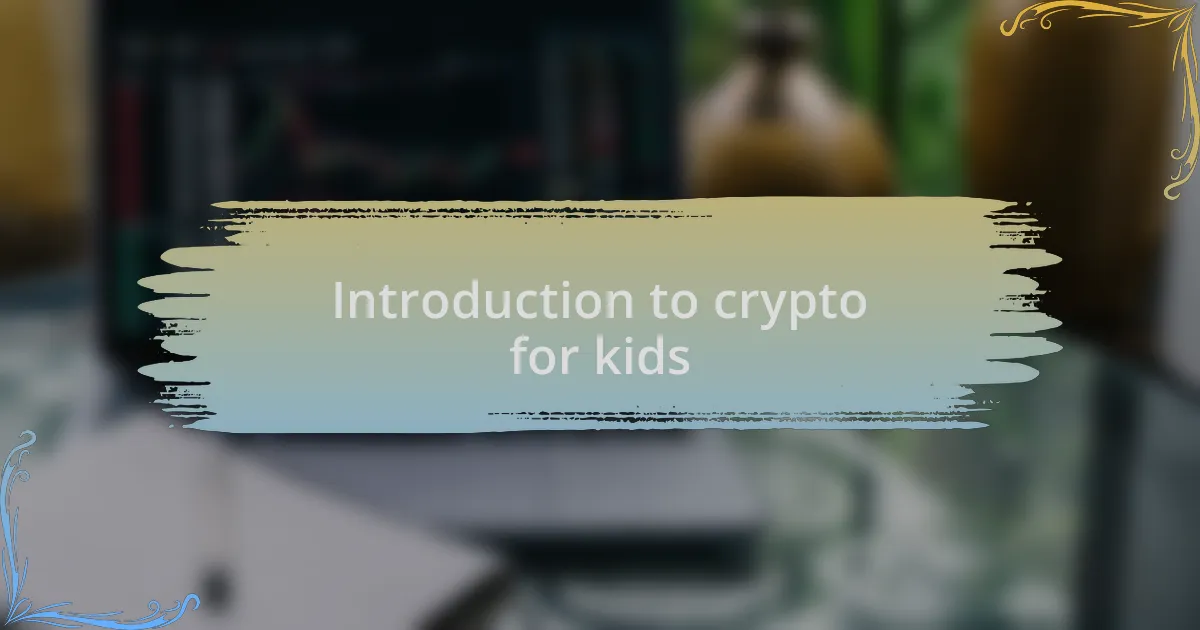
Introduction to crypto for kids
Diving into the world of cryptocurrency can seem overwhelming for kids, yet it offers a fantastic way to introduce financial literacy in a fun and engaging format. I remember the first time I explained to my niece how cryptocurrencies like Bitcoin work. The spark in her eyes when she grasped the concept of digital coins and how they could be traded was unforgettable. Wouldn’t it be exciting if children could learn the basics of investing while simply having fun?
When we think about the implications of crypto, it’s not just about the money. It’s about educating young minds on the principles of decentralized finance and the importance of security online. I once shared an anecdote about how my favorite video game allowed players to earn in-game currency, which led to a captivating discussion about valuing digital assets. Have you noticed how kids are naturally drawn to technology? This makes them incredibly suited to understand the digital nature of cryptocurrencies, transforming complex topics into relatable lessons.
Connecting game nights to financial literacy can be powerful. What if a simple board game could teach kids about investing or saving? I’ve often thought about turning our family game nights into crypto-themed sessions where we simulate trading or even create our own digital currencies. It feels like a captivating blend of fun and education, allowing children to explore important concepts in an environment they already enjoy. How do you think kids would react to learning about money while playing a game?
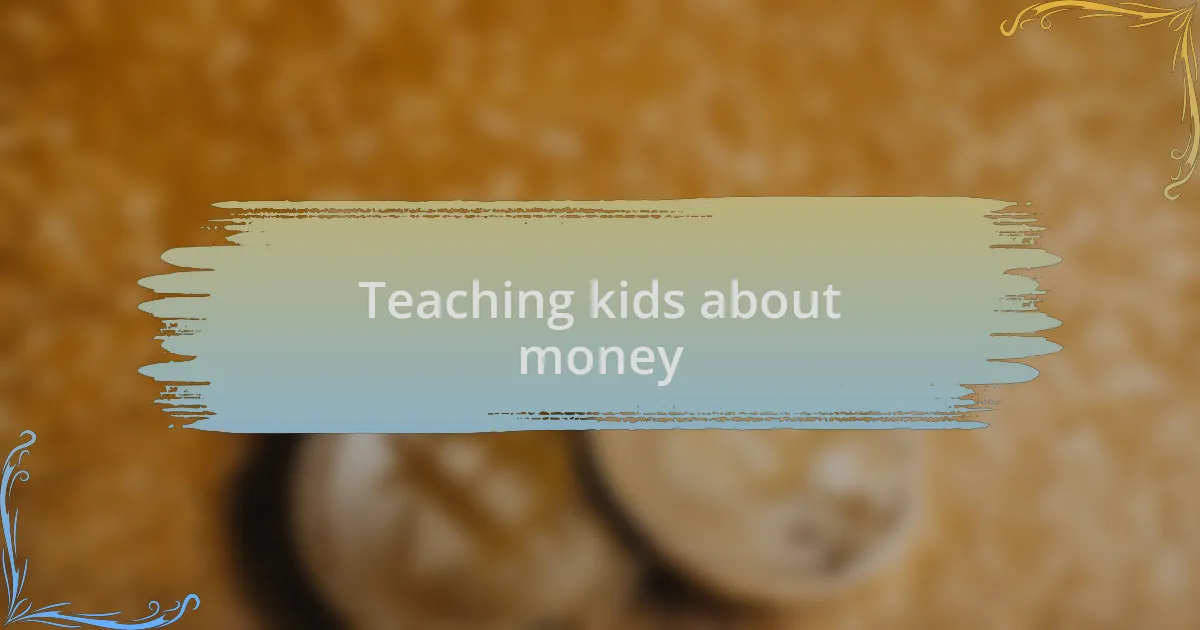
Teaching kids about money
Teaching kids about money can be both enlightening and fun. During one family game night, we played a game that required players to buy and sell properties. I vividly remember my son carefully considering his purchases, deciding when to invest and when to hold back. Witnessing him grasp the concept of opportunity cost was particularly rewarding—have you ever seen the lights go on in a child’s eyes when they realize that every decision has consequences?
In my experience, using playful scenarios to explain financial concepts can really make a difference. For instance, I once devised a simple ‘currency’ using candy during our game night. Each piece represented a small amount of cash, and we discussed the idea of saving versus spending as we played. It was fascinating to see how my kids started prioritizing their “investments” in candy, relating it back to real-life budgeting. Wouldn’t it be great if kids could apply such lessons beyond the game?
Moreover, I believe integrating discussions about saving and investing into everyday activities enhances the learning experience. After a fun game of Monopoly, we sat down to talk about the value of saving for bigger purchases, like a new videogame console. That’s when I saw my daughter’s gears turning as she calculated how long it would take to save enough money. Have you ever noticed how financial discussions become easier when they come from shared experiences, rather than lectures?
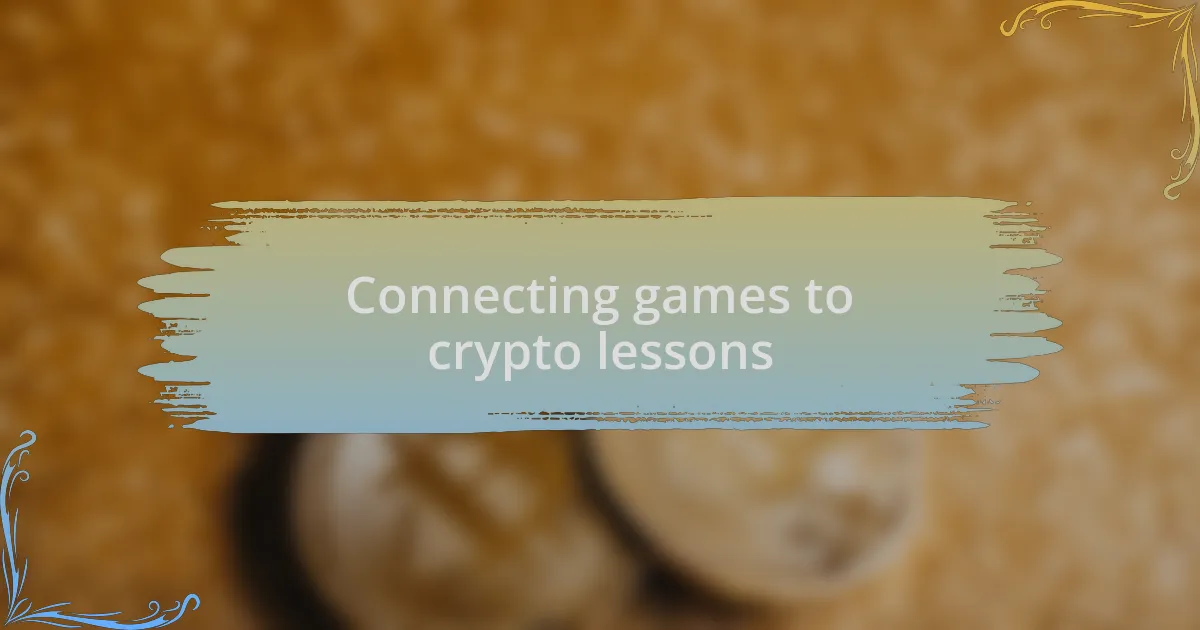
Connecting games to crypto lessons
Connecting games to crypto lessons can feel like a natural extension of family game nights. I remember one evening when we started using a game that had players trade items to complete challenges. It was fascinating to see my kids start to barter, just as people do in cryptocurrency transactions. Watching them negotiate prices mimicked the trade-offs in crypto markets—when to sell and when to hold on became real for them.
I often find it helpful to draw parallels between gaming strategies and cryptocurrency principles. During our family game night, I introduced a “crypto round” where players could earn digital tickets for participating in trades. This hands-on experience made them think about the volatility of cryptocurrency—how quickly their earnings could rise or fall based on their decisions. Have you ever noticed how kids pick up concepts when they feel the thrill of the game?
Incorporating lessons from crypto can make subjects like risk management and diversification more relatable. After explaining how diversifying their assets could help them succeed in the game, I saw real investment thinking taking shape—it was like seeing them light up with possibilities. Isn’t it rewarding to realize that the playful moments can lay the groundwork for understanding complex financial systems?

Fun games to learn crypto
One of the most fun games we discovered was a card game where players collected “crypto coins” while navigating a virtual marketplace. I remember my daughter’s excitement as she struck deals with her siblings, realizing that just like in cryptocurrency, the right trade at the right time could make all the difference. Could there be a better lesson about timing and opportunity?
We also enjoyed a board game that simulated a crypto mining operation. As we rolled the dice and moved our pieces, it was fascinating to see my son genuinely get invested in the concept of mining and its challenges. Struggling with limited resources helped him grasp that the effort put into earning crypto isn’t guaranteed to pay off immediately—mirroring real-world scenarios.
Another favorite was a digital game designed for kids, where they learned to create their own cryptocurrency. I was surprised at how quickly my kids picked up on concepts like blockchain and supply limits, engaging with these ideas while having fun. It made me wonder: can gamifying education be just as powerful as traditional methods for teaching about finance?

Personal insights from my experiences
During our family game nights, I felt a sense of wonder as I watched my kids unravel complex concepts like cryptocurrency right before my eyes. Just recently, we played a trivia game focused on crypto history. My son, usually shy about answering questions in group settings, surprised us all by confidently sharing facts he had memorized. It made me realize how engaging games can empower children to express their knowledge.
One memory that stands out is when we created our own mini crypto trading platform using household items as currency. Seeing my daughter negotiate trades for “toys” and adapt her strategies based on other players’ moves was exhilarating. It was as if I was watching her learn the principles of supply and demand in real-time. Could it be that through such playful interactions, kids not only grasp financial concepts but also develop critical life skills?
The emotional highs and lows during these games often sparked deeper conversations about money management and trust. I remember a moment when tensions rose over a trade gone wrong, leading to a discussion about risk and the importance of making informed decisions. Reflecting on these experiences, I can’t help but think: isn’t it incredible how family game nights can extend beyond entertainment to foster essential life lessons?